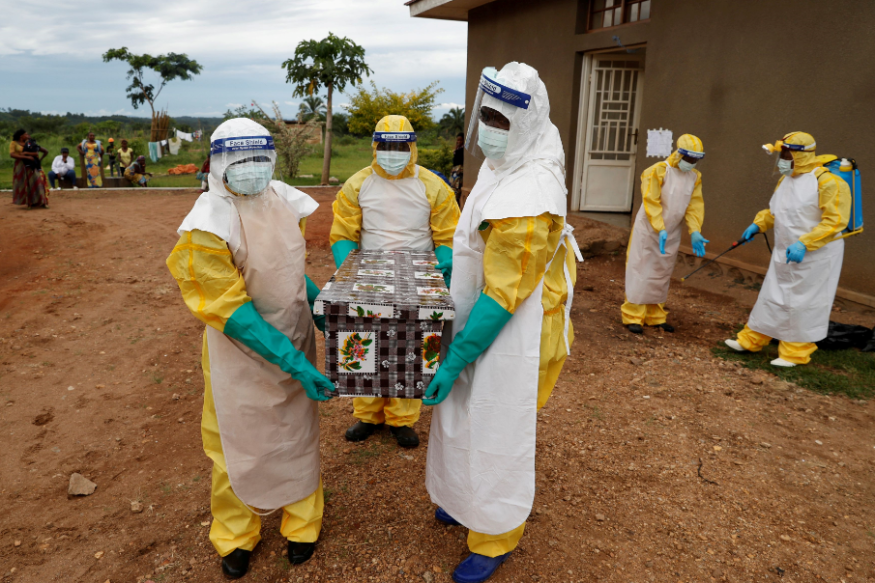Guinea's latest Ebola epidemic was most likely caused by a sick person during the previous outbreak seven years ago. Viruses from both outbreaks were almost genetically similar. Meaning that the virus did not transmit from animals to humans as scientists have anticipated but actually had been hiding for years in a human body.

The latest Ebola outbreak in Guinea, which has sickened at least 18 people and killed nine, has brought back painful memories of the catastrophic epidemic that ravaged the West African nation between 2013 and 2016, killing over 11,000 people in Guinea, Liberia, and Sierra Leone.
World Health Organization's top emergency official Mike Ryan said per Reuters that the early findings based on original genetic sequencing were "remarkable" because of the length of time the virus seemed to have lingered. He did, however, advocate for further testing.
At the same meeting, a second WHO official said it was too early to draw any conclusions about the outbreak's cause.
Ebola, one of the deadliest viruses ever found, can be spread from bats or monkeys to humans. It can survive in areas of the body that are typically normal, such as the skin, breasts, and testicles. It can also be spread, for example, by sperm.
The preliminary results, according to Ryan, highlight the importance of not stigmatizing Ebola survivors and providing them with the follow-up and care they need.
What is Ebola Virus?
The Centers for Disease Control and Prevention said symptoms of Ebola virus disease include fever, abdominal pain, unexplained hemorrhaging, bleeding, or bruising. It was first found along the Ebola River in the Democratic Republic of Congo in 1976 and has since resurfaced regularly, infecting people in many African countries.
Scientists, according to UPI, suspect the virus is transmitted by animals, with bats or nonhuman primates as the possible carriers, making the new finding all the more shocking.
Ebola Survivors have been exposed to a great deal of stigma. Many conspiracy theories swirled in the wake of the outbreak, according to Frederic Le Marcis, a social anthropologist at the école Normale Supérieure de Lyon and the French Research Institute for Growth. According to theories, survivors allegedly sold their family members to foreign organizations to protect themselves from the virus.
Dan Bausch, a veteran of several Ebola outbreaks who leads the United Kingdom's Public Health Rapid Support Team, told Science Mag, that there is a need for an awareness campaign about Ebola virus. While survivors must be treated medically, he insists it is not enough to screen them for the Ebola virus.
ALSO READ : Ebola Virus Detector Performs Well
How Did The Current Ebola Outbreak Happen?
Scientists knew the Ebola virus could survive in the human body for a long time, Science Mag said. A survivor who shed the virus through semen more than 500 days after his diagnosis and infected a partner by sexual contact caused Guinea's resurgence in 2016.
Eric Delaporte, an infectious disease physician at the University of Montpellier, said the new outbreak that started from latent infection five years after the end of an epidemic is "scary and new."
Delaporte says that while outbreaks caused by Ebola survivors are still unusual, the discovery poses tough questions about avoiding them without further stigmatizing Ebola survivors.
Experts discovered Guinea's new epidemic after a 51-year-old nurse died in late January after being diagnosed with typhoid and malaria. Four people died after falling sick while attending her funeral, including family members and a local healer who had treated her.
Researchers believed Ebola was to blame for all of the deaths, and the virus was found in the blood of the nurse's husband in early February. On February 13, an Ebola outbreak was announced, with the nurse as the possible index case.
The nurse was not considered to be a survivor. Still, she may have had private or professional contact with one or have been poisoned years before with little signs.
Dan Bausch, the head of the UK's Public Health Rapid Support Team and a survivor of many Ebola outbreaks, said one of the most pressing issues is finding out what happened.
Check out more news and information on Ebola Outbreak on Science Times.
© 2026 ScienceTimes.com All rights reserved. Do not reproduce without permission. The window to the world of Science Times.












